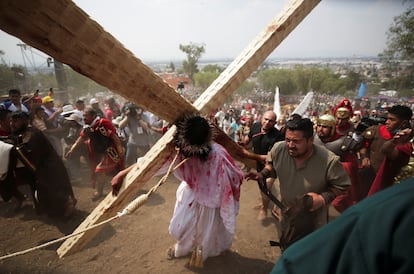The enduring mystery of Jesus’ cry on the cross: ‘My God, my God, why have you forsaken me?’
Bible scholars are still debating the meaning of one of the most remarkable events in the Gospels

Bible scholars are still debating the Gospel accounts of the crucifixion of Jesus, and Holy Week raises more unanswered questions every year. While the four canonical Gospels (Matthew, Mark, Luke and John) all describe the life, earthly ministry, death and resurrection of Jesus, no other Gospel narrative presents so many apparent differences and contradictions as the Christ’s condemnation and death.
The subject was controversial in the first Christian communities, and the debate continues to this day. Did the Romans or the Jews kill Jesus? Some extremists blame the Catholic Church for supporting Nazism and the Holocaust by fomenting pointless grudges between two faiths born of the same Judeo-Christian tradition. Before Pope John XXIII began stressing the universal Church and decrying interdenominational strife, the Catholic Church’s Good Friday liturgy included the words “perfidious Jews,” referring to the rejection of Jesus by the Jews who called for his crucifixion.
Every year, Christianity commemorates the death and resurrection of Jesus, undoubtedly the most influential figure in the Western world’s religions, culture and customs. No one has had so many scholarly books written about them — there are now more than a million. Yet, theologians still cannot fully explain the Biblical and historical accounts of Jesus’ last week on Earth as a man.
Foremost among all the unanswered questions is why Jesus uttered his heart-rending cry on the cross. “About three in the afternoon, Jesus cried out in a loud voice, ‘Eli, Eli, lema sabachthani?’” which means “My God, my God, why have you forsaken me?” (ESV, Matthew 27:46). Since Holy Week culminates in the glory and hope of Jesus’ resurrection on Easter Sunday, most modern theologians interpret these words as representing a despair of divine abandonment that continues to resonate 2,000 years later. Others say it questions whether Jesus saw himself as God, which annually resurrects the notion that Jesus regarded himself as a “son of man.” In Aramaic, the common language of those times, the words mean he was a human being like everyone else.
In fact, Jesus’ cry of despair and abandonment as he died before a mocking crowd means he saw himself as a Jew who knew the Scriptures and the history of his people. This becomes clear when reading an Old Testament account of Jesus’ agony on the cross: “My God, my God, why have you forsaken me? Why are you so far from saving me, so far from my cries of anguish? My God, I cry out by day, but you do not answer, by night, but I find no rest.” (ESV, Psalm 22:1-2). By reciting this ancient psalm, Jesus reveals he died not only as a savior and God, but as a man whom even God the father seems to have abandoned.
For Christians, Easter Sunday (or Resurrection Sunday) has always been seen as the crowning and glorious moment of Jesus Christ’s victory over death. It responds to the human yearning for rescue from pain and death. The Gospel image of Jesus on the cross is of someone who does not feel like a savior or God, but a man abandoned, which somehow brings him closer to our frail human existence.
We live in times fraught with uncertainty about our future and even our present, marked by wars, the threat of annihilation and technological anxieties that question our intelligence as Homo sapiens. Millions of us feel abandoned.
We live in times riddled with enigmas that cannot be deciphered and make us doubt our identity as human beings. Amid this whirlwind of unknowns, doubts and anxieties, of anguish about what may await our children in a fallen world, Jesus’ death on Good Friday often seems much closer to us than his resurrection.
At 90, I am still convinced that, despite our fears and despair about a frightening and ever-shifting future, we are better off than our ancestors and have greater hope that a new world, more just and equitable than our own, may come about from those things that frighten us today with their incomprehensible novelty.
I also understand that because of all the disruption we experience while we are dragged toward this new and uncertain world, believers today feel closer to Jesus’ desperate cry on the cross than to the promise of the resurrection.
Yes, Christ’s cry of pain and abandonment is still sadly and vividly real for the millions of people condemned to death by the ambition of a few, and who leave this world wondering why God, whoever he may be, has abandoned them.
Still, I wish everyone a happy Easter, believers or not, for we are all brothers and sisters, seekers of peace and happiness and not of the wars and holocausts that make us think we have been abandoned to the fates.
Sign up for our weekly newsletter to get more English-language news coverage from EL PAÍS USA Edition
Tu suscripción se está usando en otro dispositivo
¿Quieres añadir otro usuario a tu suscripción?
Si continúas leyendo en este dispositivo, no se podrá leer en el otro.
FlechaTu suscripción se está usando en otro dispositivo y solo puedes acceder a EL PAÍS desde un dispositivo a la vez.
Si quieres compartir tu cuenta, cambia tu suscripción a la modalidad Premium, así podrás añadir otro usuario. Cada uno accederá con su propia cuenta de email, lo que os permitirá personalizar vuestra experiencia en EL PAÍS.
¿Tienes una suscripción de empresa? Accede aquí para contratar más cuentas.
En el caso de no saber quién está usando tu cuenta, te recomendamos cambiar tu contraseña aquí.
Si decides continuar compartiendo tu cuenta, este mensaje se mostrará en tu dispositivo y en el de la otra persona que está usando tu cuenta de forma indefinida, afectando a tu experiencia de lectura. Puedes consultar aquí los términos y condiciones de la suscripción digital.









































